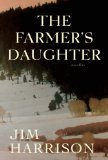Summary | Excerpt | Reviews | Beyond the Book | Read-Alikes | Genres & Themes | Author Bio

Critics' Opinion:
Readers' Opinion:
First Published:
Dec 2009, 384 pages
Paperback:
Sep 2010, 320 pages
 Book Reviewed by:
Book Reviewed by:
Elena Spagnolie
Buy This Book
This article relates to The Farmer's Daughter
In "Brown Dog Redux," the second novella in Jim Harrison's The Farmer's Daughter, an enigmatic quality surrounds the character of Charles Eats Horses. At Wounded Knee he sits alone in the moonlit cemetery, arms raised to the sky; the next morning he is found unmoving in a trance-like state; and throughout the story his peers carefully avoid eye contact with him. Though little else is given to explain these behaviors, Charles Eats Horses tells Brown Dog that "[The others] think I might be a wicasa wakan..."
As Harrison describes, a wicasa wakan is a "medicine man, often a somewhat frightening person like a brujo in Mexico," and is capable of great powers. In The Anthropological Papers of The American Museum of Natural History (1921, translated by Burt Means), Sword, an Oglala Lakota  native, explains that the role of a wicasa wakan extends beyond that of a healer and is difficult to define completely. He states that, "Wakan means very many things… It is something that is hard to understand… The white people call our wicasa wakan 'medicine man,' which is a mistake. Again, they say a wicasa wakan is making medicine when he is performing ceremonies. This is also a mistake. The Lakota call a thing a medicine only when it is used to cure the sick or the wounded, the proper term being pejuta." In this way, there is a great distinction between a medicine man and a holy man in Lakota culture.
native, explains that the role of a wicasa wakan extends beyond that of a healer and is difficult to define completely. He states that, "Wakan means very many things… It is something that is hard to understand… The white people call our wicasa wakan 'medicine man,' which is a mistake. Again, they say a wicasa wakan is making medicine when he is performing ceremonies. This is also a mistake. The Lakota call a thing a medicine only when it is used to cure the sick or the wounded, the proper term being pejuta." In this way, there is a great distinction between a medicine man and a holy man in Lakota culture.
"When a priest uses any object in performing a ceremony, that object becomes endowed with… something like [a spirit], the priests call it tonwan or ton. Now, anything that thus acquires ton is wakan because it is the power of the spirit or quality that has been put into it," Sword explains. These spiritual powers have the ability to act positively or negatively. For example, it is possible for a root or certain plants to be wakan because they are poisonous. However, nourishing foods can be wakan because they provide sustenance for the people. Even people under the influence of alcohol might be considered wakan if the bad spirit has gone into him. The wicasa wakan, then, can harness the power of the wakan beings. With the spirit of the wakan beings, they are able to communicate with other spirits through song and ceremony, they have the power to interpret visions, and they can speak in conversation with Nature.
According to Lame Deer, a Sioux medicine man, "You can't explain it except by going to the circles within circles idea, the spirit splitting itself up into stones, trees, tiny insects even, making them all wakan by his ever presence. And in turn all these myriad of things which make up the universe flowing back to their source, united in the one Grandfather spirit." (WildWest.org)
Image above: Sword, Oglala Lakota, 1875
Filed under Places, Cultures & Identities
![]() This "beyond the book article" relates to The Farmer's Daughter. It originally ran in February 2010 and has been updated for the
September 2010 paperback edition.
Go to magazine.
This "beyond the book article" relates to The Farmer's Daughter. It originally ran in February 2010 and has been updated for the
September 2010 paperback edition.
Go to magazine.





The Funeral Cryer by Wenyan Lu
Debut novelist Wenyan Lu brings us this witty yet profound story about one woman's midlife reawakening in contemporary rural China.
Your guide toexceptional books
BookBrowse seeks out and recommends the best in contemporary fiction and nonfiction—books that not only engage and entertain but also deepen our understanding of ourselves and the world around us.